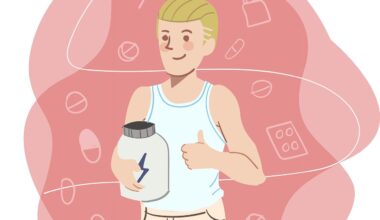Why Adequate Sleep is Essential for Injury Prevention
The relationship between sleep and injury prevention is often understated, yet it plays a crucial role in our health. For athletes, adequate sleep is not simply a luxury, but a necessity. Insufficient sleep can lead to increased injury risk due to impaired cognitive function and delayed reaction times. When the body is well-rested, it is better equipped to withstand physical challenges. A consistent sleep schedule has been shown to improve both physical performance and mental resilience. Sleep acts as a form of recovery, allowing the body to repair itself at a cellular level. This recovery is essential for maintaining and enhancing muscle performance. Lack of sleep can lead to muscle fatigue, which increases the probability of strains or sprains. High-quality sleep helps to optimize hormone levels that control muscle growth and repair. Sleep also has a direct impact on inflammation in the body. Adequate rest helps to reduce inflammatory markers, which can otherwise slow down recovery processes. As a result, prioritizing sleep is essential for anyone looking to minimize injury risks and promote optimal health outcomes.
Consistency in sleep duration is key to maximizing recovery. Adults generally require between seven to nine hours of uninterrupted sleep each night. Factors like stress, environmental noise, and lifestyle choices can disrupt this crucial downtime, making attention to sleep hygiene essential. Techniques such as establishing a bedtime routine, limiting screen time before sleep, and creating a dark, cool environment can promote better sleep quality. Sleep deprivation can adversely affect mood and cognitive function. These changes can, in turn, impair decision-making during physical activity. Proper sleep enhances concentration, energy levels, and coordination, which are all vital in sports or strenuous physical activities. Athletes should therefore consider their sleep habits as an integral part of their training programs. Ensuring proper recovery through sleep can help achieve peak performance levels. The consequences of neglecting sleep may not be immediately evident, which can lead to overtraining and potential injuries. To combat this risk, integrating naps into a daily routine can also be effective. Napping can provide a short period of restorative rest, especially in times of increased training or competition.
Impact of Sleep on Muscle Recovery
Muscle recovery is another significant benefit of adequate sleep. During the sleep cycle, particularly during deep REM phases, muscle growth occurs, along with the repair of tissue damage endured during physical activity. Hormones like growth hormone and testosterone are released more abundantly during sleep, facilitating recovery processes. If sleep quality is compromised, the body may struggle to complete these regeneration tasks effectively. Consequently, the repair of muscles can be delayed, resulting in longer recovery times and an elevated risk of acute injury. Furthermore, when the body is fatigued, the coordination between the muscles and nervous system can become impaired. This hampers an athlete’s ability to execute precise movements, increasing the likelihood of injuries. Chronic lack of quality sleep has even been linked to long-term conditions like chronic fatigue syndrome or burnout. Athletes must be proactive when addressing sleep-related issues to mitigate these risks. Keeping track of sleep patterns can be beneficial. Using sleep tracking devices can provide insights into sleeping habits to identify areas for improvement, leading to better recovery outcomes and injury prevention.
In addition to physical benefits, sleep has mental health implications that affect athletic performance and injury risk. Psychologically, insufficient sleep can lead to stress and anxiety, which may influence an individual’s approach to sports or fitness training. A calm and focused mind contributes to better physical performance and decision-making abilities. Sleep helps regulate mood and emotional responses. Athletes with poor sleep quality may struggle with motivation, focus, and emotional stability, all of which are vital during competitions or practice sessions. Moreover, these emotional disturbances can increase the likelihood of engaging in risky behaviors, potentially leading to injuries. Prioritizing sleep can improve emotional resilience, which aids in better coping with challenges in sports. Engagement in mindfulness practices, such as meditation or yoga before bedtime, has also proven advantageous. These practices help clear the mind, ensuring that sleep can be both restorative and uninterrupted. Athletes should aim to incorporate relaxation techniques into their routines to enhance sleep quality. By doing so, they can significantly lower injury risks and enhance their overall performance in their respective sports.
Sleep Hygiene for Athletes
Practicing good sleep hygiene is crucial for maximizing recovery and injury prevention. Creating a sleep-friendly environment can lead to improved sleep quality. Some effective strategies include keeping the sleep space dark, cool, and quiet. Utilizing sleep masks and earplugs can also help block out distractions. It is also recommended to go to bed and wake up at consistent times, even on weekends, to regulate the body’s internal clock. Engaging in regular physical activity significantly contributes to better sleep quality but should be timed appropriately. Exercising too close to bedtime can have the opposite effect, making it hard to fall asleep. Limiting caffeine and heavy meals before bed will also facilitate a smoother transition into sleep. Implementing a wind-down period before sleep, such as reading or taking a warm bath, can signal to the mind and body that it’s time to relax. Athletes who prioritize these practices can experience enhanced sleep quality, leading to reduced injury risks. Further, focusing on nutrition plays a fundamental role in sleep quality, and optimizing dietary choices can have a profound impact.
The role of nutrition in supporting good sleep hygiene cannot be overstated. Consuming a balanced diet rich in vitamins and minerals helps support overall bodily functions, including sleep regulation. Specific nutrients like magnesium, found in nuts and leafy greens, play a critical role in promoting relaxation and sleep. A diet lacking in essential nutrients may hinder an athlete’s ability to recover effectively. Foods that are high in serotonin, such as whole grains, promote better sleep quality. Recommendations include avoiding heavy or spicy meals right before bed, as they can lead to discomfort and disrupted sleep patterns. Hydration is also vital; however, care should be taken to limit fluids close to bedtime to avoid unnecessary sleep interruptions. Understanding nutrients that promote sleep can lead to better recovery rates post-injury. Athletes can consult with nutritionists to create a meal plan that supports recovery processes. Furthermore, education on how sleep influences performance should be emphasized in sporting environments. Helping athletes understand the connections between sleep, injury prevention, and overall performance can motivate them to prioritize restorative rest.
Conclusion: Prioritizing Sleep
Prioritizing adequate sleep is essential for injury prevention and recovery among athletes as well as fitness enthusiasts. The influence of quality sleep on physical and psychological aspects cannot be ignored. Dedicating time to restorative sleep can make a significant difference in performance levels and overall health. Recognizing the signs of sleep deprivation and making necessary adjustments can prevent injuries from occurring. Athletes should be educated on the importance of sleep and its impact on their performance and recovery. Consequently, implementing supportive structures for sleep hygiene within training environments encourages athletes to embrace rest as a valuable component of their regimen. By adopting positive sleep habits and understanding the physiological benefits of restorative sleep, individuals can increase their chances of enduring longevity in sports. Consistent sleep allows athletes not only to improve their training outcomes but also to foster a healthy lifestyle. As the link between sleep, recovery, and injury prevention becomes clearer, it is imperative to recognize sleep as an integral aspect of athletic achievement. Overall, improved sleep can lead to enhanced performance and a decrease in injury risks.
By integrating these strategies into daily routines, athletes can experience long-term benefits that enhance their careers and well-being. Moreover, embracing sleep as a critical element of injury prevention paves the way for maximizing athletic potential. The journey towards optimal performance begins with prioritizing sleep.


